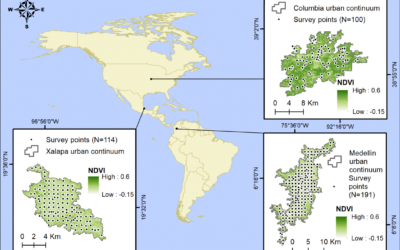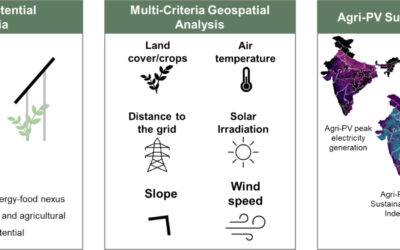New publication on migrant motives and the socio-economic conditions of local and migrant populations in Ghana, West Africa
Researchers from the Koforidua Technical University in Ghana, the Kwame Nkrumah University of Science and Technology of Kumasi in Ghana, the Kent State University in the USA, the University of Cape Coast in Ghana, the Arizona State University in Tempe in the USA, the University of Würzburg in Germany and the Earth Observation Center (EOC) of the German Aerospace Center (DLR) in Germany teamed up for a study on migrant motives and the socio-economic conditions of local and migrant populations in Ghana, West Africa. The pre-print of the paper titled “How Do Rural Industrial Sites Impact Migrant Motives and the Socio-Economic Conditions of Local and Migrant Populations?” was just published in the journal Scientific African by Itohan-Osa Abu, Michael Thiel, Clement Nyamekye, Yaw Mensah Asare, Emmanuel Agyapong, Benjamin Agbemor, Ebenezer N.K. Boateng, Chibuike Ibebuchi, Tobias Ullmann, Jürgen Rauh and Hannes Taubenböck.
Here is the abstract of the paper: Understanding the impact of rural industrialization on migration motives and the socio-economic well-being of local and migrant populations is critical for developing policies that aim at improving living standards and ensuring inclusive economic growth. Previous studies have emphasized rural-to-urban migration in Ghana, this study investigates the socio-economic impacts of rural industrial sites on local and migrant populations, drawing on a comprehensive survey conducted across various villages in Ghana, West Africa. We examine the pull effects of rural industrial sites as sources of economic growth and social transformation. Through a detailed questionnaire survey leveraging mobile technology, the research captures responses from 1,102 respondents, comprising both Indigenous people and migrants, to understand the complex socio-economic dynamics at play. Our findings show that among other factors, migration patterns are principally influenced by socio-economic motives, with significant gender differences in both motivations and outcomes. The logistic regression analysis indicates that men are more likely to migrate for socio-economic reasons compared to women, with an odds ratio (OR) of 1.50, which is statistically significant at a 95% confidence level. On the other hand, women are more likely to migrate for family reunification. Furthermore, individuals with earnings above the minimum wage prior to migrating were significantly more likely to migrate, with a statistically significant OR of 2.82, suggesting that higher initial earnings might ease the migration process, and it is not always not the poorest people that migrate. Additionally, migrants citing socio-economic reasons for moving to the rural industrial sites are significantly more likely to achieve satisfactory outcomes, with a statistically significant OR of 5.12. Our results show that though migrant experiences may vary, industrial sites in rural communities boost local employment and economic activities. These findings emphasize the critical role of economic success, information access, and demographic factors in shaping migration experiences and outcomes, offering valuable insights for cross-national labour migration and policy development.
Here is the link to the full paper: https://www.sciencedirect.com/science/article/pii/S2468227625000171?via%3Dihub
This study was conducted within the framework of the MIGRAWARE project with funding from the German Federal Ministry of Education and Research (BMBF; FKZ: 01LG2082B).
This research belongs to a group of works in the context of migration in West Africa, e.g.: https://onlinelibrary.wiley.com/doi/full/10.1002/psp.2732









